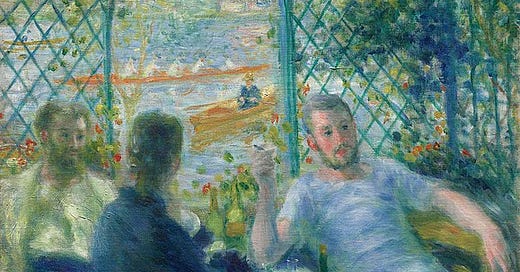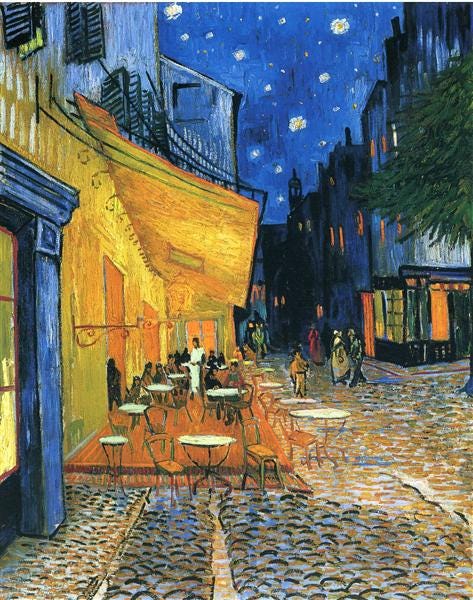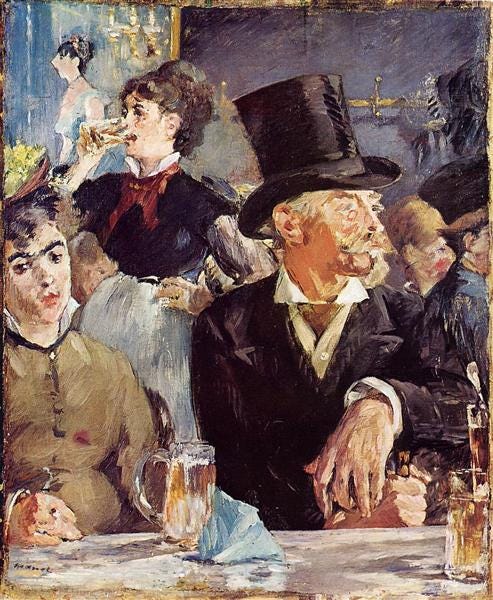Happy Saturday!
I hope you’re having a lovely start to your weekend.
What I’ve been up to:
I spent a ton of time on my latest essay on life changes—why they're hard and how I'm trying to cope.
After a lot of hard work, my good friend CJ Kirk launched a coaching platform, Conquer Culture, to deliver his decades of coaching experience at scale.
I'm in beautiful Black Mountain, North Carolina this weekend for Rabbit-hole-athon 3.0. "A learning retreat for technologists to dive into intellectual rabbit-holes".
Here are the most interesting ideas I've explored this week.
Enjoy.
✍️ quote i’m pondering:
Russian writer Aleksandr Solzhenitsyn on the duality of good and evil:
“The line separating good and evil passes not through states, nor between classes, nor between political parties—but right through every human heart…
To do evil a human must first believe that what he’s doing is good.”
📚 book passage i loved:
"Who is Igjugarjuk?" I said, barely able to imitate the pronunciation.
"Oh," replied Campbell, "he was the shaman of a Caribou Eskimo tribe in northern Canada, the one who told European visitors that the only true wisdom 'lives far from mankind, out in the great loneliness, and can be reached only through suffering. Privation and suffering alone open the mind to all that is hidden to others.' "
"Of course," I said, "Igjugarjuk."
― The Power of Myth by Joseph Campbell with Bill Moyers
This reminded me of something I heard recently: Whenever somebody has great wisdom, assume they earned it through great pain.
💡 idea from me: making choices, big and small
Bit more of a casual, stream of consciousness post this week.
A few weeks ago, I wrote in my journal:
I’m starting to doubt that when it comes to life decisions there’s a “best choice” or even a “right choice”. Choices can't be measured, quantified. Life is too complex, unpredictable, spontaneous. Even if a "right choice" existed, there’s no way of knowing what it is.
You can make one decision and it can be years before you understand how meaningfully it altered the trajectory of your life.
My new thinking around decisions is something like: for the set of choices you're struggling to decide between (meaning they're all rational and reasonable and legal) there isn't a "right choice". Rather, you make what you choose "right" by committing to it, falling into it, and (paradoxically) not worrying about whether it was actually the right choice.
A friend sent me this book passage from The Unbearable Lightness of Being:
“There is no means of testing which decision is better, because there is no basis for comparison. We live everything as it comes, without warning, like an actor going on cold."
If I were to boil it down to a formula, part of a good decision is the thing itself (e.g. not marrying a serial killer) but the other important often ignored part is just owning your decision in its entirety and being satisfied with it (e.g. not thinking about other partners who could be better).
You almost have to say to yourself, "Despite the other choices I could have made this is the choice I did make and I'm going to trust it was the right one and live with it and stop thinking about the unactualized potentialities that I didn't bring into being."
(Wow that sounded pretty smart for an internal monologue).
I was at a friend's cottage last week and one night he mentioned how the famous Robert Frost poem, The Road Not Taken, is massively misunderstood.
You know the one:
Two roads diverged in a wood, and I—
I took the one less traveled by,
And that has made all the difference.
Frost wrote the poem to tease his chronically indecisive friend.
He's not advising him to take the uncommon path. He's poking fun at his friend’s tendency to terrorize himself at what might have been when there's no way of knowing. According to Frost, the two roads are “really about the same.” Interchangeable.
It matters less what we choose, but more that we choose. Make our choice and go forward with confidence and conviction. Indecision is the danger zone.
Like Satre thought, it's the contemplation of the near-infinite lives we could live that leads to anguish.
I think that's what makes commitment so meaningful (and optionality so overrated). You're closing off the vast infinite for the visible finite and then settling into it.
I liked this tweet I saw yesterday:
Everything might not turn out like you imagined, but it'll all end up okay. Because you will post rationalize your decisions and narrativize your conditions into a palatable story you can live with.
It'll all end up okay.
On another note, I went to some live jazz a few weeks ago. By accident actually. But it was so good that for those 30 minutes I forgot about life choices entirely.
❓ question i’m asking:
A question from billionaire founder and investor Peter Thiel:
If you have a 10-year plan to get somewhere, ask yourself: Why can't I do this 6 months?
📸 photo of the week:
My three favourite “cozy cafe” paintings to make your weekend a little more beautiful:
Thank you for reading! It means a lot to me :)
Spread the love—If you want to support my work, the best way to do so is by sharing it with others who would enjoy it.
Beyond that, click the ❤️ button on this post so more people can discover it.
Get in touch—If my writing resonated or if you just want to be friends, please reach out 😊 Reply to this email, leave a comment, or find me on Twitter!
With love,
Tommy







